Disarmament Toolkit 2023 Edition
UNRCPD and the Prajnya Trust conclude the 2023 edition of the Disarmament Toolkit online course.
The second edition of the Disarmament Toolkit, jointly organized by the United Nations Regional Centre for Peace and Disarmament in Asia and the Pacific (UNRCPD) and the India-based Non- Governmental Organization (NGO) the Prajnya Trust, took place virtually from 21 to 30 June 2023, for a total of six sessions. The course reached out to a diverse group of participants including students, esteemed professors, representatives of international organizations, civil society organizations and practitioners.
Day 1 was commenced by Mr. Aaron Junhoung Yoo, Deputy Director of UNRCPD, who provided introductory briefing on the normative framework of international efforts on disarmament, non-proliferation and arms control, particularly the UN Secretary General’s agenda for Disarmament, “Securing Our Common Future”.
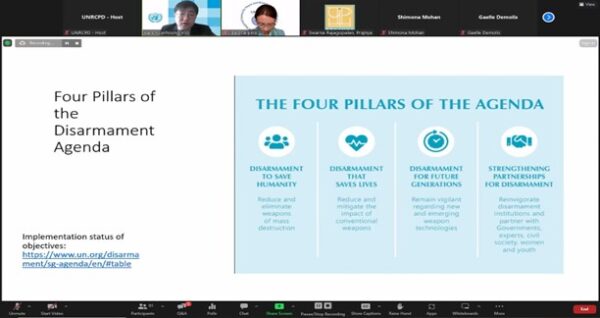
Figure 1 Mr. Aaron Junhoung Yoo, UNRCPD Deputy Director, presenting the four pillars of the UN Secretary General’s Agenda for Disarmament.
Subsequent presentations delivered by a panel of experts composed of Mr. Henri Myrttinen, Lead Associate at Gender Associations International Consulting, Ms. Natasha Singh Raghuvanshi from the Monash Gender, Peace, and Security Centre and Ms. Gaelle Demolis, Governance, Peace, and Security Specialist at UN Women Regional Office for Asia focused on converging agendas, such as Women, Peace, and Security (WPS) and Sustainable Development Goals (SDG).
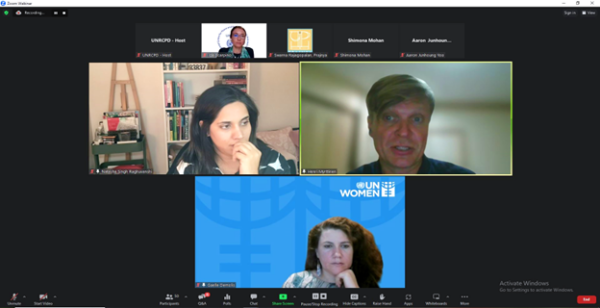
Figure 2 Mr. Henri Myrttinen, Lead Associate at Gender Associations, Ms. Natasha Singh Raghuvanshi from the Monash Gender, Peace, and Security Centre and Ms. Gaelle Demolis, Governance, Peace, and Security Specialist at UN Women Regional Office for Asia engaging with the participants.
Day 2 of the course focused on conventional weapons, including certain conventional weapons that are incompatible with International Humanitarian Law (IHL). The first speaker of the day, Mr. Ruben Nicolin, an Associate Researcher in UNIDIR’s Conventional Arms and Ammunition Programme, provided a comprehensive overview of definitions of conventional arms as well as of key global instruments such as the Arms Trade Treaty (ATT), The Firearms Protocol and UN Programme of Action on SALW.
The second speaker Mr. Llewelyn Jones, Regional Director for Asia at the Mines Advisory Group (MAG), guided participants through the definitions and global frameworks related to Certain Conventional Weapons (CCW). Mr. Jones also presented the work of the MAG on humanitarian mine action at the global and regional level and discussed with the audience persistent humanitarian concerns, such as the continued use of landmines and improvised mines in on-going conflicts.
Day 3 focused on Weapons of Mass Destructions (WMD), starting with Mr. Aaron Junhoung Yoo, who gave a detailed presentation on nuclear weapons. Mr. Yoo emphasized that disarmament is the best protection against such dangers but achieving this goal has been a highly difficult challenge. However, as Mr. Yoo explained, a number of multilateral treaties such as Nuclear Non-Proliferation Treaty (NPT), Treaty on the Prohibition of Nuclear Weapons (TPNW), Anti-Ballistic Missile (ABM) and The Comprehensive Nuclear Test Ban Treaty (CTBTO) have since been established with the aim of preventing nuclear proliferation and testing, reinforcing the global goal of achieving a world free of nuclear weapons.
The second speaker of the day, Mr. Keegan McGrath, Senior Policy Officer in the Office of Strategy and Policy at the Organization for the Prohibition of Chemical Weapons (OPCW) presented definitions of chemical weapons and educated the audience on the work of the OPCW in monitoring and advising on the implementation of the Chemical Weapons Convention (CWC), the first disarmament agreement negotiated within a multilateral framework that provides for the elimination of chemical weapons.
Next, Ms. Melanie Gerber, Political Affairs Officer in the Biological Weapons Convention Implementation Support Unit (BWC-ISU) of UNODA, explained the historical background behind biological weapons and contextualized how they eventually led to the adoption of the BWC, and how the convention works. In conversation with the audience, Ms. Gerber specified that biological hazards are dramatically evolving, while on the positive side, interest and attention toward these matters have increased following the COVID-19 pandemic.
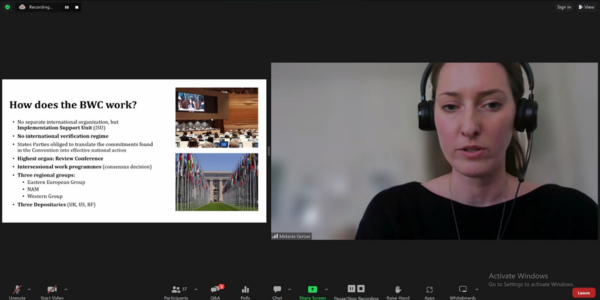
Figure 3 Ms. Melanie Gerber Political Affairs Officer at UNODA presenting the Biological Weapons Convention (BWC).
Also on this day, Mr, Rene Holbach, Political Affairs Officer in the Science, Technology and International Security Unit at UNODA provided a comprehensive overview of the technologies on missiles and informed that there are no multilateral legally binding instruments regulating missiles, but rather regimes of voluntary and politically binding nature. He emphasized that missiles continue to be a focus of increased international attention, given their potential to carry and deliver WMD.
On Day 4 Mr. Charles Ovink, Political Affairs Officer in the Regional Disarmament and Information Outreach Branch of UNODA presented on emerging technologies and responsible innovation, focusing on artificial intelligence (AI). Mr Ovink emphasized the risk of bias embedded in the data based on which AI produces information and the need of the international community to remain attentive and promote security protocols, while adapting to new threats and the fast-changing cybersecurity landscape.
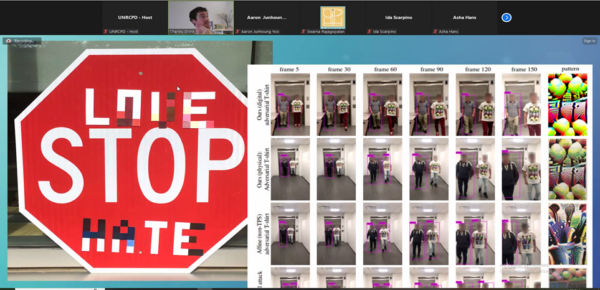
Figure 4: Mr. Charles Ovink, Political Affairs Officer from UNODA, presenting on emerging technologies and responsible innovation.
Next, Mr. Micheal Spies, Deputy Chief of the UNODA Geneva Branch, presented the efforts within the United Nations to maintain outer space for peaceful purposes and existing legal frameworks, such as the Treaty on Principles Governing the Activities of States in the Exploration and Use of Outer Space, including the Moon and Other Celestial Bodies (Outer Space Treaty) as well as the role of the UN General Assembly’s resolutions in establishing norms, rules and principles of responsible behaviors, as well as in promoting Transparency and Confidence-Building Measures. Mr. Spies continued the discussion with the participants on the threat posed by the increasing number of orbital debris and the current efforts to track them.
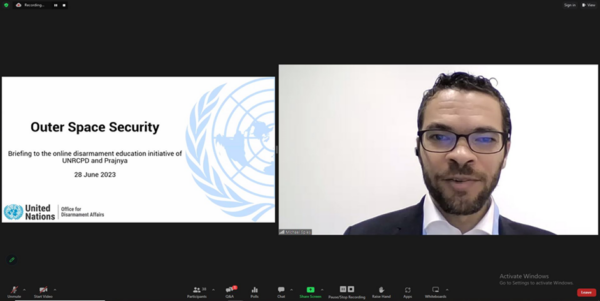
Figure 5: Mr. Micheal Spies, Deputy Chief of the UNODA Branch in Geneva, talking about Outer Space Security.
Coming to Day 5, the panel of esteemed experts composed of Dr. Andrea Ellner, Professor at the King’s College of London, Ms. Asha Hans, Director from the India-based CSO Sansristi, and Dr. Sorcha McLeod, from the faculty of Law at the University of Copenhagen, engaged the participants in a thorough discussion on the concept of patriarchy, war, society, and mercenaries. The experts shared their views on the concept of human security, which intersects with different factors, such as physical threat, deprivation, climate change, lack of economic stability and access to social infrastructures such as education and health care.
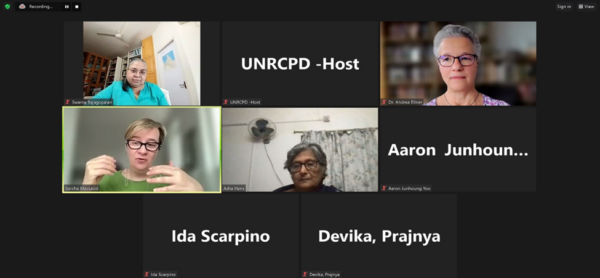
Figure 6: Ms. Andrea Ellner, Professor at the King’s College of London, Ms. Asha Hans, Director from the India-based CSO Sansristi, and Ms. Sorcha McLeod, from the faculty of Law at the University of Copenhagen, interacting with the participants.
On the final day of the course, Day 6, Ms. Bianca Patoboy, Gender and Disarmament Associate at Miriam College and Center for Peace Education (CPE) in the Philippines and Senior Program Officer of the Global Network of the Peacebuilders, Ms. Shimona Mohan and Ms. Monalisa Hazarika from the UNODA initiative #Leader4Tomorrow and #Youth4Disarmament, and Ms. Rebecca Irby, Director of Programs & Services at the New Detroit Justice Institute, guided participants on existing learning platforms, volunteer networks, and opportunities to promote civil society and youth engagement in disarmament, arms control and non-proliferation. By discussing with a panel of speakers from a diverse background, participants appreciated the conversation on the need to cultivate strong voices and creating dialogue and promoting non-traditional concepts of security and cross-cultural awareness.
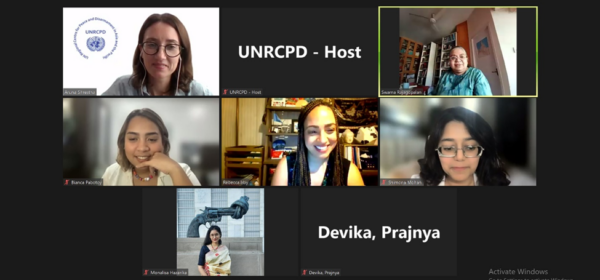
Figure 7: Ms. Bianca Patoboy, Gender and Disarmament Associate at Miriam College and Center for Peace Education (CPE) and Senior Program Officer of the Global Network of the Peacebuilders, Ms. Shimona Mohan and Ms. Monalisa Hazarika from the UNODA initiative #Leader4Tomorrow and #Youth4Disarmament, and Ms. Rebecca Irby, Director of Programs & Services at New Detroit Justice Institute, engaging with the participants.
The Disarmament Toolkit concluded with closing remarks by Mr. Deepayan Basu Ray, Director of UNRCPD, and Ms. Swarna Rajagopalan, Managing Trustee of the Prajnya Trust, who reiterated the commitment of the respective organization in promoting disarmament education and fostering a culture of peace and the next generation of peace agents.
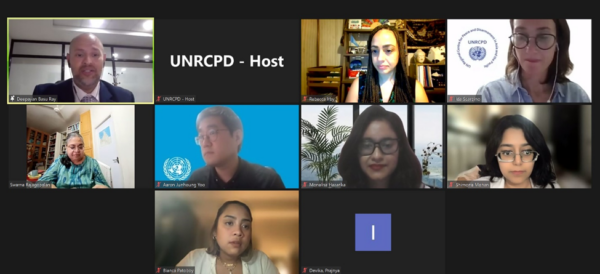
Figure 8: Mr. Deepayan Basu Ray, Director of UNRCPD, and Ms. Swarna Rajagopalan, Managing Trustee of the Prajnya Trust, concluding at the Disarmament Toolkit online workshop.
The 2023 Disarmament Toolkit course concluded successfully, reaching a broad range of participants and enhancing access to information and knowledge about disarmament, non-proliferation and arms control. The course also contributed to fostering a gender-inclusive approach to disarmament. UNRCPD and the Prajnya Trust will continue their joint efforts to enhance the knowledge and understanding of interested individuals and concerned citizens, with the aim of empowering them to actively engage, question, and contribute to discussions about peace and security in their respective contexts.
[Drafted by: Shristi Tamrakar, Boyi Zhang]

